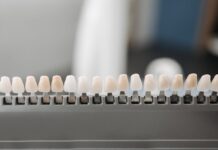Loose teeth should not concern most children, but losing teeth as a grown adult should be a serious concern. Severe gum disease can cause tooth loss in adults, so too can dental trauma.
If you are currently dealing with permanent tooth loss, then dental implants can replace your lost teeth. Here, we will focus on how you can comfortably correct permanent tooth loss with dental implants.
What Causes Permanent Tooth Loss?
70% of missing teeth in adulthood are caused by periodontal disease. Inflammation and bacteria in the gums, when left untreated, will eventually reach the roots of your teeth. The gum tissue will start to break down, and the infection will ultimately reach the jawbone.
Once the jawbone is affected, there will no longer be any support for your teeth, leading to loose teeth and eventual permanent tooth loss.
Cavities can also cause tooth loss. Cavities are holes in the teeth that are caused by a bacterial infection.
The infection will cause your teeth to decay and will eventually reach the pulp in the affected tooth: At this point, the only way to salvage the tooth is via a root canal. If the damage is too pronounced, then the tooth will need to be extracted.
Poor nutrition can also cause tooth loss. For example, eating acidic and sugary foods and drinking acidic beverages can lead to cavities and periodontal disease.
A lack of vitamin C can also lead to a disease known as scurvy, which will lead to permanent tooth loss if not treated in time. Certain drugs, such as methamphetamines, will also cause very serious dental problems, including losing all of one’s teeth.
Smoking has also been linked to oral and throat cancer, as well as gum disease.
Certain medical conditions may also increase the risk of gum disease. For instance, osteoarthritis, hypertension, and diabetes have been linked to gum disease. A physical injury or trauma can also cause a tooth, or multiple teeth, to be lost.
Avoid using your teeth to open nuts, chew ice, loosen knots, or open caps. Car accidents and falls can cause tooth loss, so wear your seatbelt at all times when in a vehicle and avoid slippery surfaces whenever possible.
You should also wear a mouthguard to play sports, such as basketball, hockey, or football.
Is Losing a Tooth Considered a Dental Emergency?
Tooth loss in adults is very serious. If you notice loose teeth as an adult, you should make an appointment with your dentist as soon as possible.
While a chipped or cracked tooth may cause more intense pain than a loose tooth, a loose tooth is still serious and constitutes a dental emergency.
Any dental issue requiring immediate intervention to relieve intense pain, stop excess bleeding, or salvage a tooth should be seen as a serious dental emergency.
Immediate dental treatment can help save your teeth and your smile. It may even save your life, as a dental abscess can spread to your lungs and heart and may cause death in some cases.
How Dental Implants Help to Correct Permanent Tooth Loss
Tooth loss can impact your self-esteem and may make you feel insecure about your smile. If you have several missing teeth, you may seek a permanent solution to help replace your lost teeth.
Currently, the most effective solution for lost teeth is to receive dental implants. A dental implant looks and feels like a regular tooth, so people will not tell the difference.
Dental implant surgery will replace your tooth roots with screw-like posts that are made of metal. Your missing tooth will be replaced by a synthetic tooth that resembles an organic tooth’s texture, appearance, and structure.
The bone around the new tooth will need to heal tightly around the implant for the procedure to be a success. This may take several months. Bridgework or dentures may not be possible if you lack natural tooth roots.
Bridgework or dentures that do not fit well can also be replaced via dental implants to provide a more snug and comfortable fit. There are multiple steps involved with implanting an artificial tooth.
First, the damaged and loose tooth will be extracted. Grafting, which involves preparing the jawbone for the implant, may also be required in some cases. Next, the dental implant is inserted into the patient.
Bone growth and healing will need to take place, which may take several months. Next, an abutment placement is set before the artificial tooth is placed to complete the operation.
After the procedure, you can expect some light bleeding and pain at the implant site. Your face and gums may appear swollen, and you may also notice some bruising around your gums and skin as well.
You may need to eat soft foods until the surgical site fully heals. The stitches that are used may dissolve on their own after a few days.
Non-dissolvable stitches will need to be removed by your oral surgeon during your next appointment. You may also be prescribed antibiotics and medication to prevent infection and reduce pain and inflammation.
The Benefits of Dental Implants
Dental implants look and feel like natural teeth. They will help restore bite force so you will be able to eat as you normally would. They also prevent jawbone deterioration and will help support your adjacent teeth to prevent crowding.
They serve as a permanent solution that may last a lifetime if you practice good oral habits and visit your dentist on a regular basis. They may also help improve your self-confidence and improve your mental and physical wellbeing.
If you are thinking of getting dental implants then you should make an appointment with an oral surgeon that has a proven track record of success. Check online reviews or ask a trusted friend or family member if they can recommend a qualified oral surgeon in your area.














